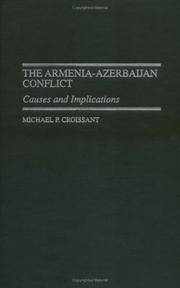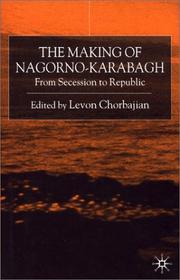| Listing 1 - 10 of 29 | << page >> |
Sort by
|
Book
ISBN: 5875320095 Year: 1994 Publisher: Moskva : Žurnal Glagol,
Abstract | Keywords | Export | Availability | Bookmark
 Loading...
Loading...Choose an application
- Reference Manager
- EndNote
- RefWorks (Direct export to RefWorks)

ISBN: 0275962415 Year: 1998 Publisher: London Praeger
Abstract | Keywords | Export | Availability | Bookmark
 Loading...
Loading...Choose an application
- Reference Manager
- EndNote
- RefWorks (Direct export to RefWorks)
Nagorno-Karabakh Conflict, 1988-1994. --- Armenia (Republic) --- Azerbaijan --- Relations
Book
ISBN: 2296993176 9782296993174 Year: 2012 Publisher: Paris: L'Harmattan,
Abstract | Keywords | Export | Availability | Bookmark
 Loading...
Loading...Choose an application
- Reference Manager
- EndNote
- RefWorks (Direct export to RefWorks)
L'ouvrage présenté ici a été commencé en 2003, puis reporté à cause de sa moindre actualité. Le manque persistant de littérature portant sur la contestation territoriale et l'absence de conséquences judiciaires - envers les Azéris en particulier - ont constitué la raison principale de cette modeste publication : remettre en mémoire une affaire presque tombée dans l'oubli. C'est pour ce motif, vingt ans après la "Trilogie des Vêpres siciliennes" commises par des paramilitaires arméniens à Khodjaly, Choucha et Latchine au printemps 1992, qu'est rendu disponible un ouvrage se concentrant sur les points de vue azéris. Afin de mieux comprendre les dimensions historiques comme actuelles des sentiments partagés en Azerbaïdjan sur un conflit en forme de bras de fer qui représente toujours une menace de guerre, des chapitres additionnels apportent une large information sur l'histoire du pays et de son peuple, sur sa culture et son économie.
Law --- Nagorno-Karabakh Conflict, 1988-1994 --- Armenia (Republic) --- Azerbaijan
Book
ISBN: 9781848856202 1848856202 Year: 2011 Volume: 1 Publisher: London ; New York I.B. Tauris Publishers
Abstract | Keywords | Export | Availability | Bookmark
 Loading...
Loading...Choose an application
- Reference Manager
- EndNote
- RefWorks (Direct export to RefWorks)
Nagorno-Karabakh Conflict, 1988-1994. --- Azerbaijan --- Politics and government --- History --- Azerbaïdjan --- Politique et gouvernement --- Histoire
Book
Abstract | Keywords | Export | Availability | Bookmark
 Loading...
Loading...Choose an application
- Reference Manager
- EndNote
- RefWorks (Direct export to RefWorks)
Nagorno-Karabakh Conflict, 1988-1994 --- Earthquakes --- Armenia (Republic) --- Nagorno-Karabakh (Azerbaijan)
Book
ISBN: 9781474450522 1474450520 1474450547 1474476546 Year: 2019 Publisher: Edinburgh : Edinburgh University Press,
Abstract | Keywords | Export | Availability | Bookmark
 Loading...
Loading...Choose an application
- Reference Manager
- EndNote
- RefWorks (Direct export to RefWorks)
The Armenian–Azerbaijani conflict for control of the mountainous territory of Nagorny Karabakh is the longest-running dispute in post-Soviet Eurasia. Laurence Broers shows how decades of dynamic territorial politics, shifting power relations, international diffusion and unsuccessful mediation efforts have contributed to the resilience of this stubbornly unresolved dispute.Looking beyond tabloid tropes of ‘frozen conflict’ or ‘Russian land-grab’, Broers unpacks the unresolved territorial issues of the 1990s and the strategic rivalry that has built up around them since
Nagorno-Karabakh Conflict, 1988-1994 --- Armenia (Republic) --- Azerbaijan --- Foreign relations --- Foreign relatins

ISBN: 0333773403 9780333773406 Year: 2001 Publisher: Houndmills: Palgrave,
Abstract | Keywords | Export | Availability | Bookmark
 Loading...
Loading...Choose an application
- Reference Manager
- EndNote
- RefWorks (Direct export to RefWorks)
Nagorno-Karabakh Conflict, 1988-1994 --- Conflit du Nagorno-Karabakh, 1988-1994 --- Congresses --- Congrès --- Nagorno-Karabagh (Azerbaÿan) --- Ethnic relations --- Congrès --- Congresses. --- Nagorno-Karabakh Conflict, 1988-1994 - Congresses --- Nagorno-Karabagh (Azerbaÿan) - Ethnic relations
Book
ISBN: 9781472435149 9781315597621 9781317089452 9781317089469 1472435141 147243515X 1472435168 Year: 2014 Publisher: Farnham: Ashgate,
Abstract | Keywords | Export | Availability | Bookmark
 Loading...
Loading...Choose an application
- Reference Manager
- EndNote
- RefWorks (Direct export to RefWorks)
Conflict resolution, conflict management and conflict transformations are major themes in this unique book which examines, explores and analyses the mediation attempts of the Organization for Security and Cooperation in Europe in the Nagorno-Karabakh conflict. The author shows the most striking characteristic of a protracted internal conflict such as this is its asymmetry and explains that, without meeting basic human needs like identity, recognition, security and participation, resolving any protracted social conflict is very difficult. The Armenian-Azerbaijani case demonstrates how official diplomacy may not be able to solve protracted internal conflicts as, without addressing the real causes of the problematic relationship, attempts at peace-making will always be sporadic and the space for mutual understanding and compromise shrinks. The author shows that conflict transformation has a particular salience in asymmetric conflicts such as this where the goal is to transform unjust relationships and where a high degree of polarisation between the disputants has taken root. Using the Nagorno-Karabakh case, this book focuses on the anatomy and causes of deadlock in negotiations and highlights the many difficulties in achieving a breakthrough.
Nagorno-Karabakh Conflict, 1988-1994 --- Azerbaijan --- Armenia (Republic) --- Peace --- Foreign relations --- Armenia (Republic)Peace --- Nagorno-Karabakh Conflict, 1988-1994 - Peace --- Azerbaijan - Foreign relations - Armenia (Republic) --- Armenia (Republic) - Foreign relations - Azerbaijan
Book
ISBN: 0814770827 9780814770825 9780814760321 0814760325 0814785867 Year: 2013 Publisher: New York, NY
Abstract | Keywords | Export | Availability | Bookmark
 Loading...
Loading...Choose an application
- Reference Manager
- EndNote
- RefWorks (Direct export to RefWorks)
"Brilliant."- Time "Admirable, rigorous. De Waal [is] a wise and patient reporter."- The New York Review of Books "Never have all the twists and turns, sad carnage, and bullheadedness on all side been better described-or indeed, better explained...Offers a deeper and more compelling account of the conflict than anyone before."- Foreign Affairs Since its publication in 2003, the first edition of Black Garden has become the definitive study of how Armenia and Azerbaijan, two southern Soviet republics, were pulled into a conflict that helped bring them to independence, spell the end the S
Book
ISBN: 3838348656 9783838348650 Year: 2010 Publisher: Saarbrücken: Lambert,
Abstract | Keywords | Export | Availability | Bookmark
 Loading...
Loading...Choose an application
- Reference Manager
- EndNote
- RefWorks (Direct export to RefWorks)
Atrocities --- Self-determination, National --- Constitutional law --- Armenians --- Conflict management --- Nagorno-Karabakh Conflict, 1988-1994 --- Nagorno-Karabakh (Azerbaijan) --- Caucasus, South
| Listing 1 - 10 of 29 | << page >> |
Sort by
|

 Search
Search Feedback
Feedback About UniCat
About UniCat  Help
Help News
News